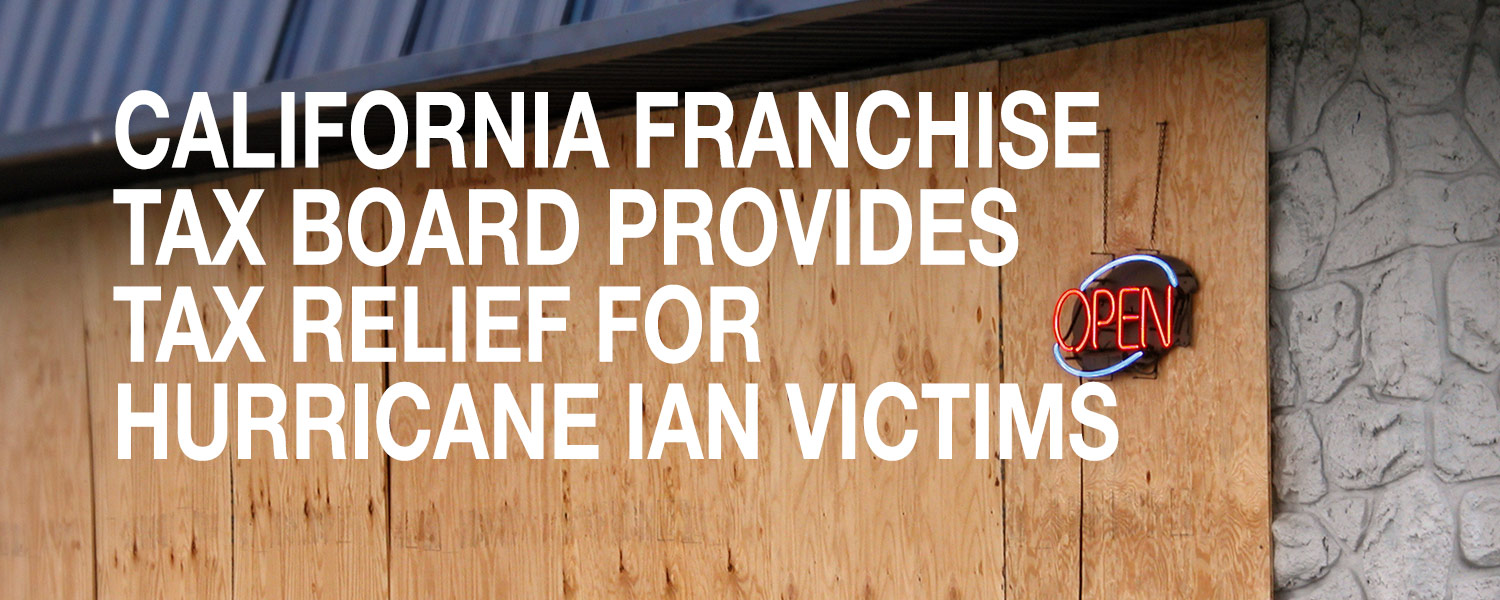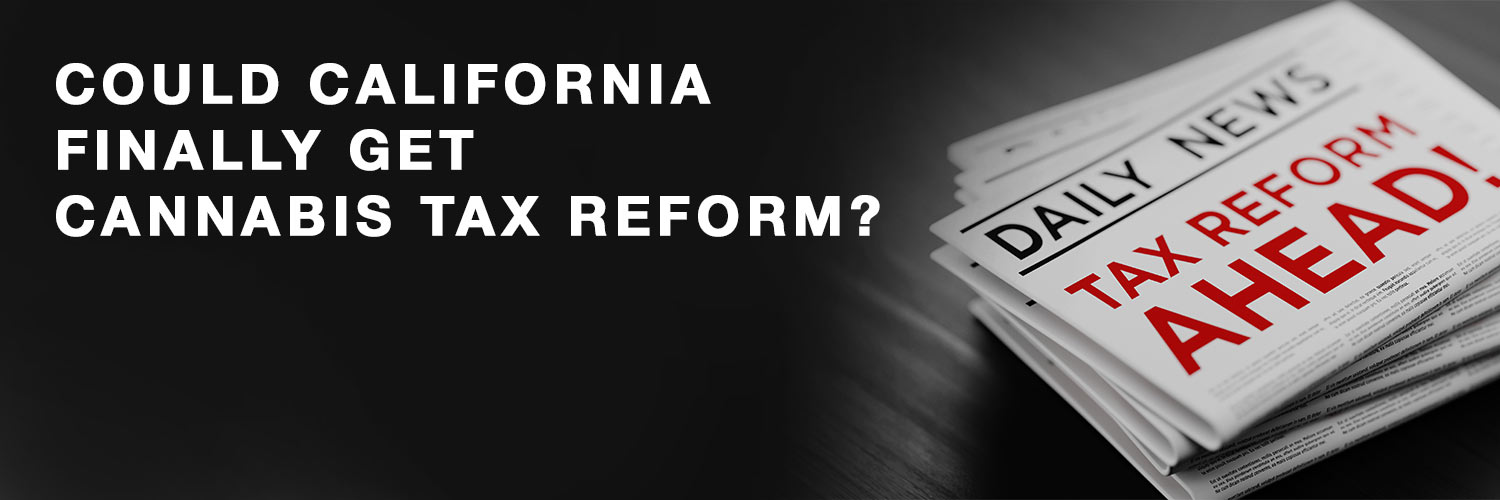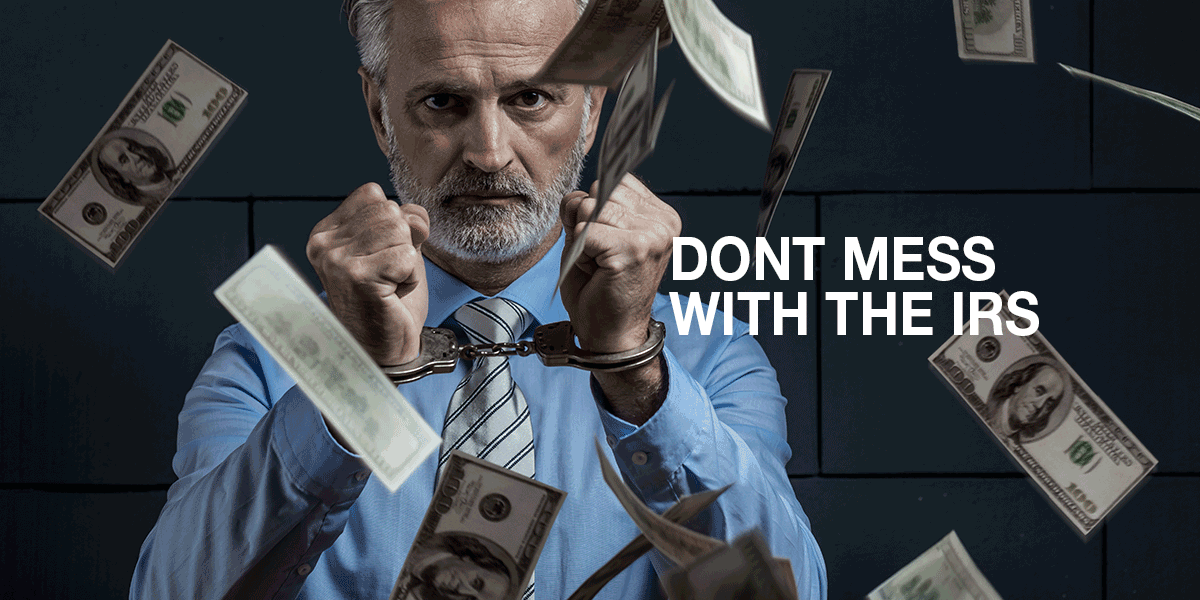California Franchise Tax Board Provides Tax Relief For Hurricane Ian Victims
California Franchise Tax Board Provides Tax Relief For Hurricane Ian Victims
The California Franchise Tax Board (“FTB”) announced on October 6, 2022 special state tax relief for taxpayers and businesses affected by Hurricane Ian.
Taxpayers and businesses in presidentially declared disaster areas are granted an extension to Feb. 15, 2023, to file California tax returns on 2021 income and make any tax payments that would have been due between September 23, 2022, and February 15, 2023.
“This offers relief to taxpayers who were victims of Hurricane Ian and have a California filing requirement,” said State Controller and FTB Chair Betty T. Yee. “For some, this will mean several additional months to file their California tax returns or make their quarterly estimated tax payment to the state.”
The relief means those affected taxpayers who would have had an October 17, 2022, tax filing deadline now have until February 15, 2023 to file. However, tax year 2021 tax payments originally due on April 18, 2022, are not eligible for the extension.
This announcement by FTB follows announcements made by IRS providing similar tax relief to taxpayers affected by Hurricane Ian in Florida, South Carolina and North Carolina. FTB automatically conforms to IRS postponement periods for presidentially declared disasters. Taxpayers who are affected by a presidentially declared disaster may claim a deduction for a disaster loss.
Tax Planning Tip
Just like with IRS, taxpayers can claim a disaster loss with FTB in one of two ways. They may claim the disaster loss for the 2022 tax year when they file their return next spring, or they may claim the loss against 2021 income on this year’s return. An amended return may be filed by those who already have filed this year. The advantage of claiming the disaster loss on a tax year 2021 return is that FTB can issue a refund sooner.
Taxpayers should write the name of the disaster (for example, Hurricane Ian) in blue or black ink at the top of their tax return to alert FTB. If taxpayers are filing electronically, they should follow the software instructions to enter disaster information. If an affected taxpayer receives a late filing or late payment penalty notice related to the postponement period, the taxpayer should call the number on the notice to have the penalty abated.
Importance To Preserve Records
Keep in mind that the FTB has up to four years to select a tax return for audit. The IRS has up to three years to select a tax return for audit. In some cases this period is extended to six years. When a taxpayer is selected for audit, the taxpayer has the burden of proof to show that expenses claimed are properly deductible. Having the evidence handy and organized makes meeting this burden of proof much easier.
Essential Records to Have for a Tax Audit
If you are getting ready for a tax audit, one of the most important things to do is gather and organize your tax records and receipts. There’s a good chance that you have a large amount of documents and receipts in your possession. No matter how organized you are, it can be a daunting task to collect the right pieces and make sure that you have them organized and handy for the audit conference.
We have seen many tax audits that hinge on whether or not the taxpayer can provide proper documentation for their previous tax filings. A tax lawyer in Orange County or elsewhere can make sure that the documentation is complete and proper. By submitting this to your tax attorney in advance of the audit, your tax attorney can review your documentation and determine if there are any gaps that need to be addressed before starting the dialogue with the IRS agent.
So what are the most essential tax records to have ahead of your audit? Here are a few must-have items:
- Any W-2 forms from the previous year. This can include documents from full-time and part-time work, large casino and lottery winnings and more.
- Form 1098 records from your bank or lender on mortgage interest paid from the previous year.
- Records of any miscellaneous money you earned and reported to the IRS including work done as an independent contractor or freelancer, interest from savings accounts and stock dividends.
- Written letters from charities confirming your monetary donations from the previous year.
- Receipts for business expenses you claimed.
- Mileage Logs for business use of vehicle.
- Entertainment and Travel Logs for business
Tips On Reconstructing Records
Reconstructing records after a disaster is important for several reasons including insurance reimbursement and taxes. Most importantly, records can help people prove their disaster-related losses. More accurately estimated losses can help people get more recovery assistance like loans or grants.
Whether it’s personal or business property that has been lost or destroyed, here are some steps that can help people reconstruct important records.
Tax records
Get free tax return transcripts immediately using the Get Transcript on IRS.gov or through the IRS2Go app. Tax return transcripts show line-by-line the entries made on your Federal income tax returns. The most three recent tax years are available.
Financial statements
People can gather past statements from their credit card company or bank. These records may be available online. People can also contact their bank to get paper copies of these statements.
Property records
- To get documents related to property, homeowners can contact the title company, escrow company or bank that handled the purchase of their home or other property.
- Taxpayers who made home improvements can get in touch with the contractors who did the work and ask for statements to verify the work and cost. They can also get written descriptions from friends and relatives who saw the house before and after any improvements.
- For inherited property, taxpayers can check court records for probate values. If a trust or estate existed, taxpayers can contact the attorney who handled the trust.
- When no other records are available, people should check the county assessor’s office for old records that might address the value of the property.
- Car owners can research the current fair-market value for most vehicles. Resources are available online and at most libraries. These include Kelley’s Blue Book, the National Automobile Dealers Association and Edmunds.
Develop And Implement Your Backup Plan
Do not wait for the next disaster to come for then it may be too late to retrieve your important records for a tax audit or for that matter any legal or business matter. And if you do get selected for audit and do not have all the records to support what was claimed on your tax returns, you should contact an experienced tax attorney who can argue the application of your facts and circumstances to pursue the least possible changes in an audit.
The tax attorneys at the Law Offices Of Jeffrey B. Kahn, P.C. located in Orange County (Irvine), Los Angeles and elsewhere in California are highly skilled in handling tax matters and can effectively represent at all levels with the IRS and State Tax Agencies including criminal tax investigations and attempted prosecutions, undisclosed foreign bank accounts and other foreign assets, and unreported foreign income. Also if you are involved in cannabis, check out what a cannabis tax attorney can do for you. And if you are involved in crypto currency, check out what a bitcoin tax attorney can do for you.











 Follow
Follow Follow
Follow